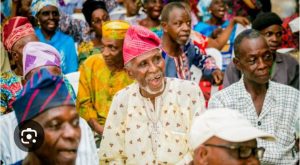

By Dada Ahmed.
(News Analysis)

(C) Peoples Gazette.
As Nigeria’s population continues to grow, one important demographic that deserves attention is its senior citizens,retirees who dedicated their most productive years to serving the nation in various capacities. With life expectancy gradually increasing, the need to ensure this class of Nigerians enjoy a dignified and comfortable old age has become more urgent than ever.
Graceful ageing is not merely about living longer; it is about living with dignity, purpose, health, and support. Both the government and private sector have vital roles to play in achieving this.
The Nigerian government at all levels must do more to recognize and treat the elderly as a priority population.
Despite decades of service in various fields,teaching, civil service, security, healthcare,many retirees face economic hardship, poor healthcare, and social isolation. Pension administration, in particular, remains riddled with delays, underpayment, and bureaucratic inefficiencies. Timely and adequate pension payments are the first step toward ensuring that retirees can meet their basic needs.
A major barrier to graceful ageing is poor access to healthcare. Ageing comes with increased vulnerability to chronic conditions such as hypertension, diabetes, arthritis, and dementia. Yet, Nigeria lacks a robust geriatric care system. Government must invest in geriatric departments in public hospitals and train more healthcare professionals in elder care. Regular free or subsidised health screenings for the elderly should also be instituted, particularly at the community level.
Health insurance for the aged is another critical area. The National Health Insurance Authority (NHIA) should create tailored insurance packages for retirees, possibly subsidised or supported through a contributory scheme while the citizen is still in active service. This ensures continuity of care and reduces out-of-pocket expenses, which can be financially crippling for pensioners.
Equally important is housing. Many senior citizens live in dilapidated homes or depend on their children for shelter. Government and private real estate developers should collaborate to create affordable retirement housing or elder-friendly communities with access to healthcare, recreation, and security. Countries like South Africa and Kenya are already experimenting with such models.
The private sector, particularly financial institutions, must also rise to the occasion. Retirees often find it difficult to access loans or financial products due to age-related biases. Banks can design age-friendly savings, credit, and investment products that take into account the predictable income streams of pensions. This financial inclusion empowers seniors to manage their affairs independently.
Employment opportunities should not be overlooked. Many retirees remain mentally and physically active and are willing to contribute. The government and private sector can engage them through part-time consultancies, mentorship programs, or community service roles. This not only supplements their income but also gives them a sense of purpose and societal relevance.
Technology offers new avenues for support. Private technological companies and startups can develop apps and platforms specifically tailored for the aged,offering health tips, medication reminders, emergency assistance, and access to social communities. With training and support, older adults can become active digital citizens, reducing their sense of isolation.
Social interaction is vital to graceful ageing. The government can establish recreational and wellness centres for the aged in every local government area. These centres would serve as hubs for socialisation, physical exercise, counselling, and access to vital information. Religious organisations and NGOs can also contribute by organising regular activities that keep the elderly engaged and valued.
Nutrition and food security for the elderly is another pressing concern. Many retirees live on meagre pensions, unable to afford balanced diets. Government, in partnership with agricultural firms, can initiate food subsidy programmes targeted at senior citizens. Community gardens or home gardening projects can also help sustain nutritious diets for them.
Legal and human rights protection for the elderly must not be ignored. Many suffer abuse, neglect, and exploitation, often from those closest to them. The government should strengthen legal frameworks that protect the rights and dignity of the elderly, including a functional Elderly Rights Commission to address grievances swiftly.
The private sector, especially media organisations, has a role in changing public perception. The elderly are often portrayed as burdens rather than assets. Positive media representation and awareness campaigns can help foster a culture that respects and values ageing.
Corporate social responsibility (CSR) initiatives should increasingly focus on elderly care. From sponsoring free health outreaches to donating assistive devices like hearing aids and walking sticks, businesses can make tangible impacts. Firms can also adopt retirement homes or support age-friendly community projects.
At the heart of graceful ageing is policy. Nigeria still lacks a comprehensive national ageing policy that addresses all dimensions of elderly welfare—health, income, housing, legal protection, and participation. The National Assembly must prioritise the passage and full implementation of such a policy, with clear mandates and budgets.
Ultimately, a society that honours and supports its elders is one that values its future. Government and private sector stakeholders must come together to create a sustainable ecosystem where Nigeria’s senior citizens can live not just longer, but better—healthy, happy, and dignified. Graceful ageing should not be a privilege; it should be a right.
Ahmed is a journalist,a publisher and a senior citizen.

